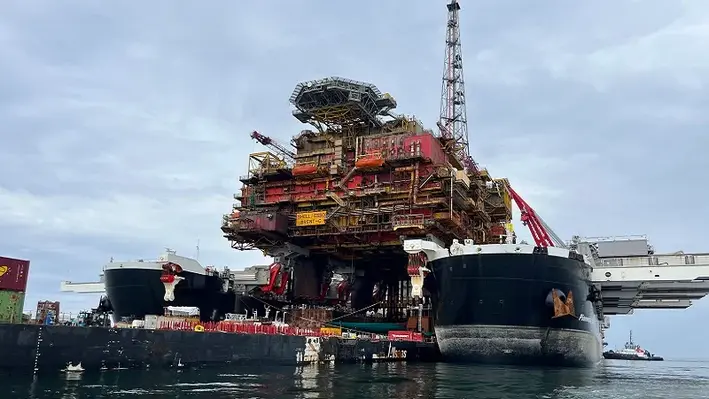

According to Mammoet, which helps clients with smarter, safer and stronger solutions for heavy lifting and transport challenges, Brent Charlie has been successfully skidded onto the quayside for decommissioning.
Brent Charlie is the last and heaviest topside from the Brent oil and gas field, located 186 km northeast of the Shetland Islands. It is now to follow its siblings – jacket-based Alpha, and gravity-based Bravo, Charlie and Delta – into a decommissioned retirement having been the last one in operation since 2014.
Mammoet has now provided an update on the project, reporting that it has successfully performed the skidding of the 31,000t topside onto the quayside, overcoming complex engineering and safety challenges in the process.
Brent Charlie was required to be removed and transported from the Brent field to the Able Seaton Port near Hartlepool, UK. In order to do so, the company followed a similar process from the previous three Brent topsides.
Allseas used its motion-compensated heavy lift vessel Pioneering Spirit to remove the structure at sea in a single lift and transport it to shallow waters, where the topside was transferred onto Iron Lady, Allseas’ purpose-built cargo barge.
Mammoet had already fitted Iron Lady with skidding equipment (some 45 truckloads of materials), which would be needed to offload Brent Charlie at the port. Mammoet also provided mooring winches for Iron Lady within specific guidelines provided by Allseas on lengths and drum load capacities.
Once the barge had moored at Able Seaton Port and settled into the seabed, the team could determine the starting height of the skid tracks on the quayside and begin laying them down. The topside was skidded over twelve skid tracks, which needed to be perfectly aligned with the skid tracks installed on the barge.
The skidding operation was performed in two stages. First, the topside was skidded five meters to the aft of the barge. Then, after 12 hours to allow for further settling, it was skidded the remaining 130 meters onto the quay, to its final position.
A configuration of 76 skid shoes - divided between the four legs of the platform - and 40 push-pull units were used to skid the topside 15 meters per hour. The combined pushing capacity was 3,320t; the total lift capacity was 51,000t.
Suspended netting was used to collect any falling debris and marine growth that might come away from the structure. All movements were remotely controlled from a control room to minimise the presence of people underneath the platform, and therefore maximise safety.
One of the primary challenges was managing the structures four legs, which cause it to be less stable during skidding. As Richard Verhoeff, Mammoet Sales Director, explained, “When you look at stability, three legs are always stable; four legs are not. You try to keep a three-point suspension when performing a load-in, and still need to achieve that even with four legs. That’s where hydraulic grouping comes in very handy.”
But there can also be some level of deflection between the legs, so the force needs to be able to communicate between the different hydraulic groups.
This is why there were hydraulic cylinders under each leg, and why the cylinders between both pairs of two legs had to be connected – to ensure the pressure on each remained the same.
Despite the various challenges, Mammoet drew from its extensive experience of performing similar operations to successfully complete the task. “We have a pragmatic approach, which is required on jobs like this,” remarked Leo de Vette, Project Manager at Mammoet. “It’s really a team operation, you must do it together. Time is of the essence, so equipment can be moved to the next job. Once the topside is on the barge, there is only one priority – get it off as safely and efficiently as possible.”
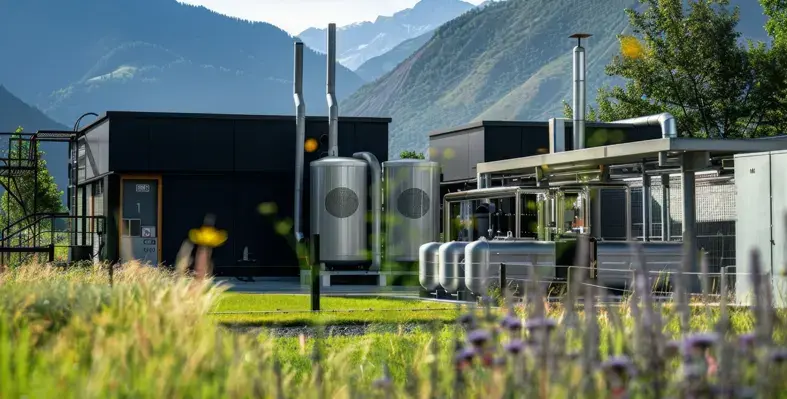
 CBRE Investment Management, on behalf of a fund managed by its Private Infrastructure division, has acquired a majority stake in Finnish geothermal company, Geonova Oy
CBRE Investment Management, on behalf of a fund managed by its Private Infrastructure division, has acquired a majority stake in Finnish geothermal company, Geonova Oy
Specialising in decentralised heating and cooling services using ground source heat pump (GSHP) technology, Geonova has around 20 years experience in providing full turn-key heating solutions, covering system design, installation and management. The demand for these systems is set for continued growth as it aligns with Finland's 2035 net zero goals. Also, Finland has the highest per capita consumption of heat in the EU.
CBRE IM has acquired an 80% stake in the company from current shareholders, including Helsinki-based Helen Oy and LampoYkkonen Oy. LampoYkkonen will retain a 20% stake in Geonova. CBRE IM has also made a further capital commitment to fund the future expansion of the business. The investment will form a core part of the strategy of CBRE IM’s Private Infrastructure division to invest in infrastructure assets and technologies that support the decarbonisation of the built environment.
Andreas Köttering, Head of Private Infrastructure Europe at CBRE IM said, “Investing in businesses like Geonova demonstrates our strategy of decarbonising the built environment. We can support that strategy by bringing to bear the capabilities of our entire CBRE platform.”
“Geonova has already established itself as a leading player in the GSHP sector in Finland,” said Kerron Lezama, Senior Director, Infrastructure Investments of CBRE IM. “We are excited to be able to work with Geonova’s excellent management team and Vesa to support its future growth as low carbon heating systems play a greater role in making buildings more energy efficient.”
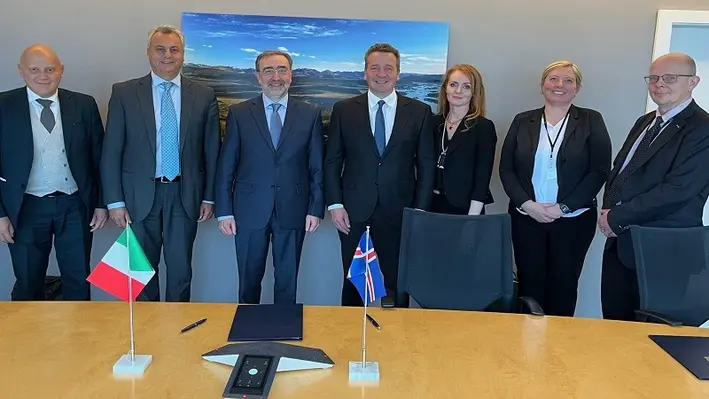
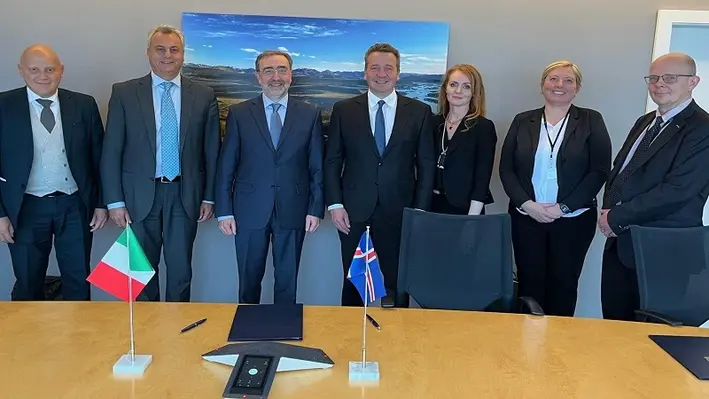 A cooperation agreement has been signed between Iceland and Italy regarding increased collaboration in the field of geothermal issues, both bilaterally and within the network of international organisations.
A cooperation agreement has been signed between Iceland and Italy regarding increased collaboration in the field of geothermal issues, both bilaterally and within the network of international organisations.
The agreement was signed by Guðlaug Þór Þórðarson, Minister of the Environment, Energy and Climate, and Stefano Nicoletti, Italy’s Ambassador to Iceland on behalf of Italy’s Minister of Energy.
Guðlaug Þór said at the signing that it was appropriate and timely for the two countries with the longest history and vast knowledge in the field of using geothermal energy within Europe to sign the agreement of cooperation.
Nicoletti said there are many similarities in the use of geothermal between the two countries: Italy’s first geothermal plant was built in 1905, garnering a breadth of experience and knowledge that the Italians bestowed onto other countries, including Iceland.
The agreement marks a new beginning of closer cooperation between the two countries, highlighting the importance of bringing experts and private sectors to the table.
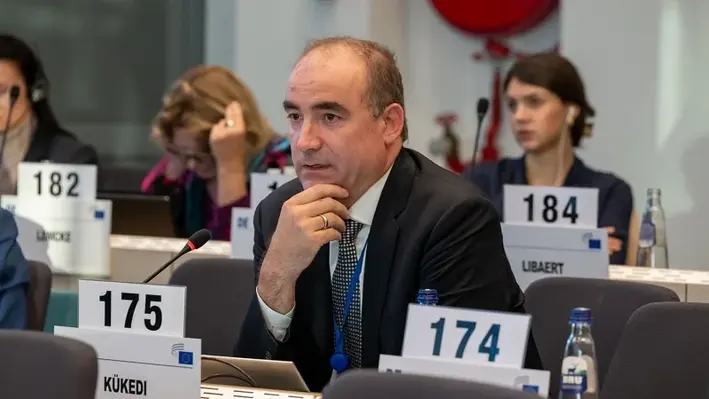

At the October plenary session of the European Economic and Social Committee (EESC), the significant untapped potential of geothermal energy in Europe was explored with members emphasising the resource as an essential part in the forthcoming energy transition.
Members Zsolt Kükedi, and Thomas Kattnig led these discussions, underlining how the low-emissions resource could help the EU reduce its dependence on fossil fuels and support decarbonisation.
“Geothermal energy can make a useful contribution to achieving the EU’s 2050 climate neutrality goals,” said remarked Kükedi.
“Its potential is unexploited and the European Commission should move immediately to put together a comprehensive strategy to make use of the resources it provides,” added Kattnig.
While the potential is near limitless, the committee was quick to point out that investment in geothermal power plants will not work without financial help at national level. Specifically, government funding and incentives will be required in order to attract and de-risk initial investments. Moreover, changes in energy policy or financing can affect the attractiveness of geothermal projects.
To bring geothermal projects online, therefore, the committee stated that the risks need to be accurately identified and that this process should be carried out with local communities with a view to increasing public acceptance.
The statement from the committee concluded by noting that currently geothermal energy is still not very developed across Europe, and its real potential remains unassessed due to insufficient geothermal resource mapping. However, as explored by the International Renewable Energy Agency, geothermal energy, as a long-lasting and cost-effective source of renewable energy, has the potential to stabilise electricity grids and partly offset risks connected to the fast deployment of variable renewables.
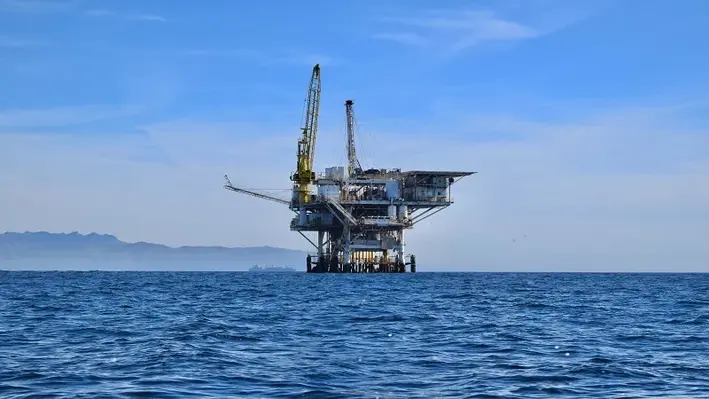

Ahead of the publication of its 2024 Decommissioning Insight, Offshore Energies UK (OEUK) has stated that operators need to plug 200 abandoned North Sea oil and gas wells a year in order to stay on top of targets.
This will be among the findings of the new report which seeks to detail the challenge facing the region’s energy industry. Multiple changes to the tax regime are causing continuing economic and fiscal uncertainly which has damaged activity levels. These goalposts are set to remain on the move following the Chancellors Autumn statement later this month.
Despite these setbacks, OEUK has said that the report will also showcase the expertise and capabilities of the UK decommissioning industry which is helping to turn this challenge into a more manageable task.
It will reportedly outline that stable government policy can help support the decommissioning industry in the UK and prevent multi-million pound contracts go elsewhere. A successful approach here could secure the future of thousands of skilled UK jobs for decades to come.
OEUK decommissioning manager Ricky Thomson said: “Operators must continue to sanction projects and the supply chain must remain resilient and competitive. The energy transition has decommissioning at its heart and sharing cross-sector information and expertise is crucial. I have no doubt we can make this happen.”
The report will be released at OEUK’s 2024 Decommissioning Conference in St Andrews, Scotland from 18-20 November.


The OWI Global Awards is returning on 14 November to gather the offshore community for a celebration as the very best in global well intervention excellence are recognised for their outstanding contribution to the industry.
Sponsored by Welltec, the 2024 edition will be held at Union Kirk in Aberdeen, Scotland, with 11 winners picked out from a wide roster of exceptional entrees. Tickets are available now and can be acquired by clicking here.
Those in attendance will have the opportunity to network with peers from the offshore community and will share in the celebration of the 2024 champions selected from the categories of:
•Best Project Outcome: Organisations that have completed an industry leading project;
•Best Example of Collaboration: Two or more organisations that have collaborated to achieve ground-breaking outcomes;
•Best Example of Digital Innovation: Trailblazers in digitising processes or solutions;
•Best Example of Downhole Innovation: Organisations with excellent well intervention technology at a subsurface level;
•Best Example of Well Integrity Innovation: Organisations with an exceptional well integrity solution or service;
•Best Example of P&A Innovation: Organisations that have a solution, technology or completed a project which signifies the best in P&A;
•Best Example of Subsea Intervention: Organisations with first-class well intervention operations in waters over 1,000+ feet deep;
•Best Example of Platform Intervention: Organisations with an outstanding project on the well head;
•Energy Transition Pioneer of the Year: Organisations spearheading the transition to greener energy through the services and tooling they offer;
•Intervention Champion of the Year: Organisations that are market leaders in the well service industry;
•Jørgen Hallundbæk Lifetime Achievement Award: An individual who has made an exceptional contribution to the well intervention community throughout their career.
With a plethora of submissions being received, the daunting task of determining the finalists from the talented entry pool and, ultimately, selecting the category winners was given to an experienced panel of judges. Industry experts from ADNOC, EGPC, ENI, Petronas and more acted as arbitrators, independently assessing and scoring each entry to determine which submissions had gone the extra mile. As such, the official 2024 finalists who are in with a chance of claiming a trophy in Aberdeen are:



Saipem, a global leader in the engineering and construction of major projects for the energy and infrastructure sectors, has signed a MoU with Geolog and Ignis H2 Energy to develop advanced technological solutions and conduct feasibility studies for new geothermal plants.
The two companies are specialised in the geothermal sector; Geolog is a leader in the evaluation of geological formation and drilling solutions, while Ignis H2 Energy expertise lies in geothermal resource acquisition, exploration and development. Saipem has moved to utilise the experience of both companies as it aims to develop advanced solutions that can enable a greater use of geothermal energy. In particular, the company is interested in next-generation geothermal energy systems, offshore geothermal energy, and the conversion of oil & gas wells.
As per the MoU, the three entities have agreed to carry out joint studies on unconventional geothermal energy such as terrestrial heat sources difficult to access as well as on offshore geothermal energy.
Saipem will lead the feasibility study of geothermal plants, by assessing the technical solutions currently available in the market and identifying potential technological gaps. Geolog and Ignis will contribute to the assessment of geological formations and drilling solutions, as well as the analysis of geothermal resources availability.
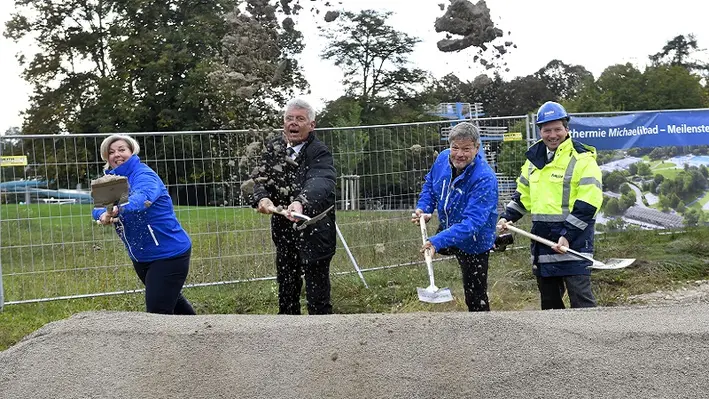

Stadtwerke München (SWM), one of the largest municipal companies in Germany, has announced that the construction for a new geothermal plant in Germany is now underway.
Already operating six geothermal plants in and around Munich, the new project will be built on the site of the Michaelibad in southeast Munich and is expected to be completed in 2033. It is being undertaken as part of SWM’s efforts to cover Munich’s district heading needs in a climate-neutral way by 2040 at the latest.
Projected to supply heat to around 75,000 Munich residents, the plant will have four extraction and four reinjection boreholes, an adjacent heating station and a large heat pump to further increase the heat yield.
So far, demolition work has been carried out on buildings where the heating station will be located and preparations have also been made for the integration of the future geothermal plant into the district heating network. Now, attention turns to construction, a milestone marked by a groundbreaking ceremony held at the site.
“Geothermal energy is a climate-neutral, inexhaustible and at the same time reliable source of energy that is available all year round,” commented Robert Habeck, Federal Minister for Economic Affairs and Climate Protection. “It can also be used to cover a persistently high demand for heat. The Munich municipal utilities are a good example of how this technology can be successful in densely populated cities. The development of geothermal heat has the potential to cover around a quarter of Germany's required renewable heat demand by 2045. The aim is to increase the current geothermal energy feed into heating networks tenfold. The SWM is actively contributing to achieving this goal.”
Karin Thelen, SWM Managing Director of Regional Energy Transition, added, “In order to generate district heating in an even more climate-friendly way, we are consistently expanding the use of geothermal energy as part of our transformation plan. 20 years after our first geothermal plant at the Riem trade fair, we are building our seventh plant here at the Michaelibad.
“We are planning another on the site of the former Virginia depot in the north of Munich, and additional locations are currently being explored with the city administration. In total, we want to build ten geothermal projects with more than 50 new deep boreholes in and around Munich. In addition, we are making our existing plants more efficient through additional drilling. Large heat pumps directly at the location of the geothermal plant, as here at the Michaelibad, should also make the heat from the return flow usable for district heating. However, without federal funding for efficient heating networks, the feat of municipal heat transition cannot be managed. We are receiving funding for the plant at the Michaelibad, for which I would like to express my sincere thanks.”
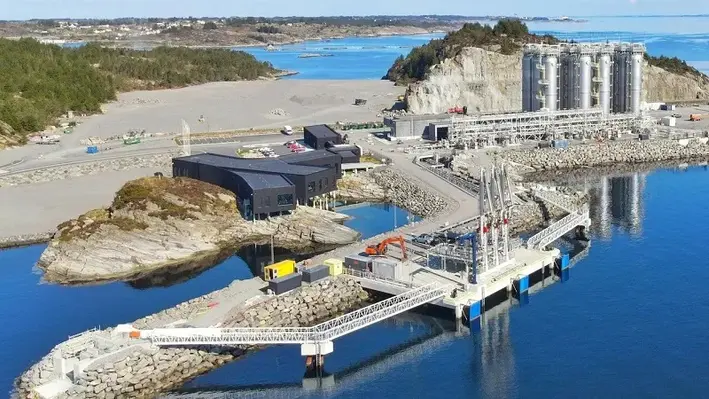

The Northern Lights cross-border carbon capture and storage facility at Øygarden in Norway has been declared completed and ready to receive CO2.
The official opening of the facility – a joint venture between Equinor, Shell and TotalEnergies – was confirmed in a visit by the Norwegian Minister of Energy. The facility is expected to provide a vital outlet for large and hard-to-abate industrial emitters that need to decarbonise their processes.
It is part of the Norwegian full-scale CCS project Longship. This includes the capture of CO2 from industrial sources and shipping of liquid CO2 to the terminal in Øygarden before transportation – via pipeline – to the offshore storage location below the seabed in the North Sea.
“The completion of the Northern Lights facility marks an important milestone for the global development of a business model for carbon capture, transport and storage. It opens a value chain for decarbonisation of European industry and energy and shows the role we and our partners take in developing low carbon solutions in the energy transition” remarked Equinor CEO Anders Opedal.
The first phase capacity of 1.5mn tons of CO2 per year is fully booked, and the joint venture owners continue to work on plans to increase the transport and storage capacity for the future.
“This project demonstrates what can be achieved when authorities and industry are working towards the same goal and co-invest to reduce risks,” added Opedal. “Equinor has several CO2 transport and storage developments in our portfolio as operator and partner. The established Northern Lights value chain and experience from the project will be valuable in maturing and scaling up future CCS projects.”
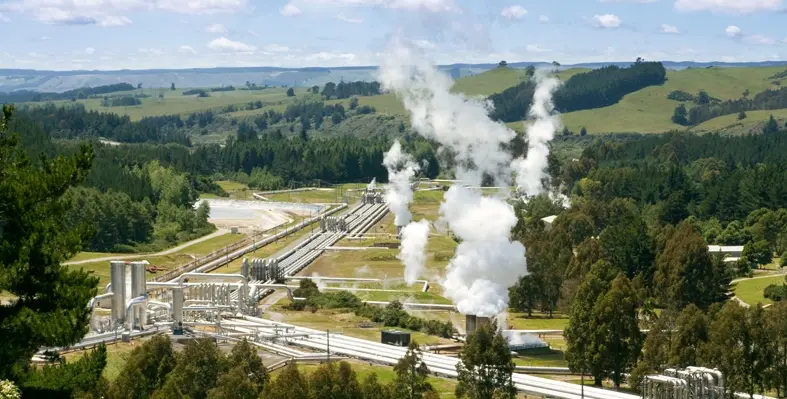
 European Commission-endorsed body, European Technology & Innovation Platform on Geothermal (ETIP-Geothermal), has launched the new vision for geothermal 2030/50, 'Geothermal Horizons: from Cities to Regions'.
European Commission-endorsed body, European Technology & Innovation Platform on Geothermal (ETIP-Geothermal), has launched the new vision for geothermal 2030/50, 'Geothermal Horizons: from Cities to Regions'.
Designed in lines with the EU climate-neutral milestone by 2050, this vision aims to address the climate transition and secure Europe’s energy supply in an affordable way. Its research agenda targets the development of novel geothermal applications tailored to meet the diverse energy needs of European citizens and industries. A crucial step is the integration of these applications into the European energy security scheme, particularly in regions vulnerable to external energy dependencies.
“This ETIP Geothermal Vision looks towards the future of geothermal energy development to achieve the European Union’s climate-neutral milestone by 2050, and it highlights the great benefits of geothermal to decarbonise our economy. It is a unique solution to allow a sustainable energy transition with a paradigm shift for a circular economy. Geothermal is a key enabler for energy system integration, bringing renewable resources to the power, and heating and cooling industries in addition to energy storage and critical raw materials supply,” said Luca Xodo, ETIP Geothermal Chair.
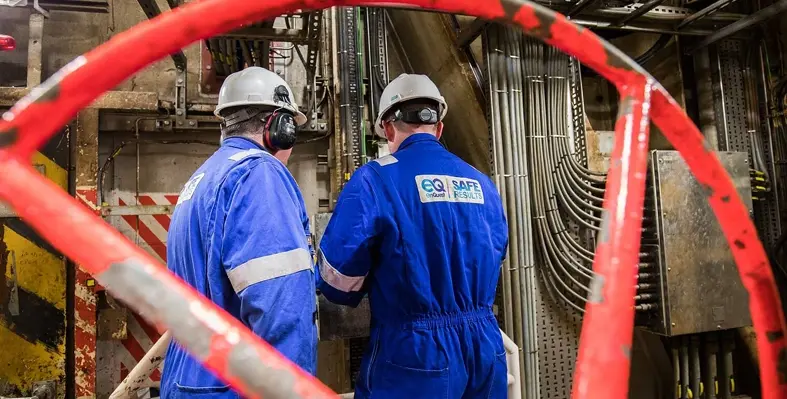

The Greater Kittiwake Area joint venture has appointed EnQuest to continue as GKA operator for the full decommissioning scope, with Shell transferring its decommissioning management role to EnQuest.
Shell had retained operator responsibility for decommissioning the Kittiwake platform and the Mallard field, a subsea tie-back to the Kittiwake platform, when it divested the GKA fields.
EnQuest is delivering on its strategic objective to be the preferred decommissioning operator in the North Sea. The company has demonstrated exceptional decommissioning operator performance through execution of complex decommissioning projects, including the removal of the EnQuest Producer and Northern Producer facilities and the ongoing and extensive well plug and abandonment (P&A) scopes at the Thistle and Heather fields at 40% below benchmark costs. It is on track to complete the P&A of 77 wells, which represents 60% of the EnQuest operated suspended and shut-in wells, within 5 years of cessation of production.
John Allan, EnQuest Decommissioning Director, said, “This is a great vote of confidence in EnQuest by our GKA partners Shell and Dana. It reflects our strong track record of safe, efficient and successful execution of complex decommissioning scopes which is an important part of our company growth strategy.“

 Offshore engineering solutions provider Aquaterra Energy has launched well re-entry and re-abandonment services along with its new patent-pending recoverable abandonment frame (RAF)
Offshore engineering solutions provider Aquaterra Energy has launched well re-entry and re-abandonment services along with its new patent-pending recoverable abandonment frame (RAF)
The combined solution will address challenges in locating, re-entering and re-abandoning legacy wells that penetrate, or pass through, offshore oil and gas reservoirs or saline aquifers that have been earmarked to be repurposed for carbon dioxide (CO2) or hydrogen storage.
The significant economic and technical challenges of re-abandoning problematic legacy wells that pose a leak risk beneath the seabed could derail many carbon capture and storage (CCS) and hydrogen storage projects, that intend to use previously penetrated oil and gas or saline aquifer formations. Technical challenges such as traditional relief well drilling could be infeasible in shallow intersects or where azimuth and depth are unknown.
Excavation methods require enormous amounts of material to be removed and may also fail to isolate re-abandonment loading from the compromised legacy well, meaning both methods may fall short in addressing technical, environmental, safety, and regulatory issues effectively.
Aquaterra Energy’s solution overcomes these challenges by employing advanced seabed and subsurface surveying technologies, well imaging, marking, and tagging to precisely locate wells. This allows the RAF to adjust to an exact well position and install conduits below the seabed to re-engage the legacy well and then back to the surface to allow for successful re-abandonment via a vertical well re-entry tieback method. Crucially the RAF also protects the legacy well components from environmental, lateral and axial loading generated by wave action on the tieback conduits and the re-abandonment operation itself.
George Morrison, CEO at Aquaterra Energy, said, “The introduction of the RAF and our re-entry services illustrate our strategy of pivoting decades of offshore expertise to address the wider challenges of the energy transition. Our team is committed to innovating and taking on the tough issues, ensuring that carbon and hydrogen storage can be effectively delivered as part of our broader commitment to driving the energy transition forward.”
The technology is intended for repeated use across multiple wells or locations with flexibility built in for differing seabed conditions. Its modular design allows for shipping worldwide or road transport for quayside assembly. This could enable the effective abandonment or re-abandonment of wells that may not have been previously possible, while also significantly lowering costs, saving operators £18-20 million per abandoned well - an estimated 80% reduction in comparison to other methods currently deployed. The approach could also lead to major reductions in project timelines, estimated to be up to 50% quicker per well.
"The RAF and our associated suite of services for legacy well re-entry represents a significant leap forward in abandonment technology," said Ben Cannell, Innovation Director at Aquaterra Energy. "Well re-abandonment for CCS is a new challenge, and our solution has been developed to meet it head-on. By reducing project risk, costs and operational time, we're not only making well abandonment more efficient, but also enabling the viability of carbon or hydrogen storage, as these projects would generally be far more costly or even impossible to deliver."
Aquaterra Energy is currently in discussions with major oil and gas operators and specialist CCS operators in several global regions, including the North Sea and APAC, to deploy their legacy well re-entry services and RAF technology.
Page 10 of 36
Copyright © 2026 Offshore Network